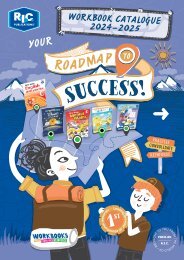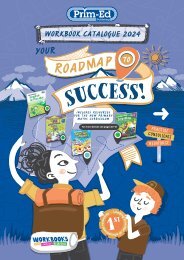RIC-20239 Primary Grammar and Word Study Year 4 – Understanding and choosing words
You also want an ePaper? Increase the reach of your titles
YUMPU automatically turns print PDFs into web optimized ePapers that Google loves.
Underst<strong>and</strong>ing <strong>and</strong><br />
<strong>choosing</strong> <strong>words</strong><br />
<strong>Word</strong> groups<br />
Focus<br />
Alphabetical order<br />
Definition<br />
• Alphabetical order is a system used to arrange<br />
items so they may be easily found.<br />
Explanation<br />
• Alphabetical order is used in many areas with<br />
which students are familiar.<br />
Example:<br />
class registers, dictionaries, libraries.<br />
• Initially, <strong>words</strong> are ordered by the first letter, then the<br />
second, third <strong>and</strong> so on.<br />
Worksheet information<br />
• Prior to completing the sheet, show students<br />
examples of how alphabetical order is used in daily<br />
life; e.g. street names in road books, names in<br />
telephone directories, indexes at the back of books.<br />
• Give students short lists of related <strong>words</strong> to place in<br />
alphabetical order, explaining that if there are two<br />
or more items beginning with the same letter, the<br />
ordering is by the second, third <strong>and</strong> so on, letters.<br />
• Initially, students group <strong>words</strong> on the worksheet<br />
based on their first letter. They then place the <strong>words</strong><br />
in each group in alphabetical order. Finally, they<br />
place all <strong>words</strong> in alphabetical order.<br />
Ideas for further practice<br />
• Make a list of 20 <strong>words</strong> that are not in the dictionary<br />
used by the students in class. (They do not need<br />
to know the meaning of the word.) Provide each<br />
student with a dictionary <strong>and</strong> a sheet of paper <strong>and</strong>,<br />
for each word, ask them to record the two <strong>words</strong><br />
between which each word would be inserted in their<br />
dictionary.<br />
• Students plan a project of their choice, initially on<br />
an explosion chart <strong>and</strong> then organised into sections,<br />
determining the number of pages required for each<br />
section. Using 20 <strong>words</strong> from the explosion chart,<br />
students create an alphabetical index linked to page<br />
numbers.<br />
• At r<strong>and</strong>om, pick 20 names, addresses <strong>and</strong> telephone<br />
numbers from a directory. Give the students the<br />
list of names <strong>and</strong> addresses. Challenge the class<br />
or group to be the first to find all the telephone<br />
numbers.<br />
Answers<br />
1. (a) a <strong>–</strong> astound, aground<br />
b <strong>–</strong> brought, bought, bough<br />
c <strong>–</strong> could, caught<br />
f <strong>–</strong> found<br />
o <strong>–</strong> ought<br />
p <strong>–</strong> profound<br />
s <strong>–</strong> source, sound, souvenir, should<br />
t <strong>–</strong> thought, trough, taught, though, through<br />
w <strong>–</strong> would<br />
©R.I.C. Publications<br />
Low Resolution Images<br />
Display Copy<br />
(b) a <strong>–</strong> aground, astound<br />
b <strong>–</strong> bough, bought, brought<br />
c <strong>–</strong> caught, could<br />
s <strong>–</strong> should, sound, source, souvenir<br />
t <strong>–</strong> taught, though, thought, through, trough<br />
(c) 2. astound 3. bough<br />
4. bought 5. brought 6. caught<br />
7. could 8. found 9. ought<br />
10. profound 11. should 12. sound<br />
13. source 14. souvenir 15. taught<br />
16. though 17. thought 18. through<br />
19. trough<br />
<strong>Primary</strong> grammar <strong>and</strong> word study 38<br />
www.ricpublications.com.au R.I.C. Publications ®

















